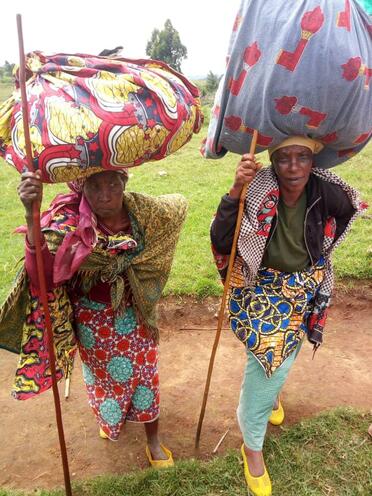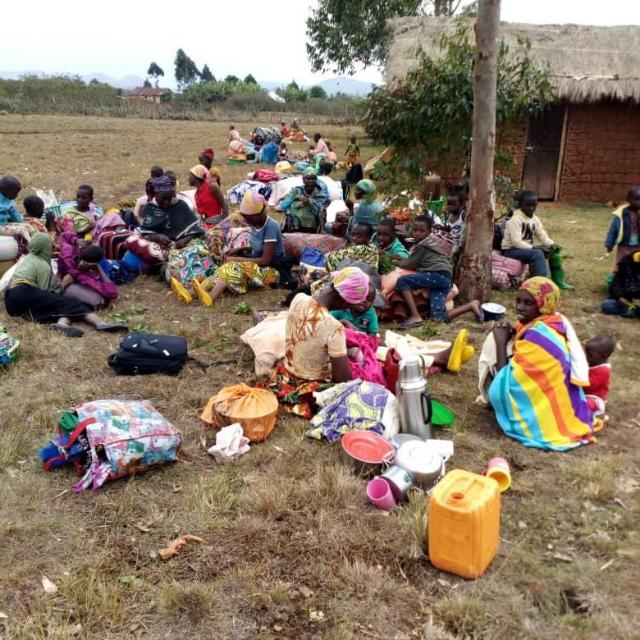In 1994, I was forced to leave my home country D.R. Congo. On this long and arduous journey, I have been asked repeatedly why I am one of the many millions of people who have been forcibly displaced. The more I try to explain and continue to do so even to this day, the more hurt and humiliated I feel. Little weight is given to the root cause of my displacement. I have sometimes been terrorised, imposed, or forced to minimise or bend the reasons for my eviction. My case and many more cases are simplified or deprived of its meaning and is simply called “refugee crisis”.

As for the readers of my story, please may I graciously ask you to remember that I am not another number not to be mentioned when COVID-19 covers the front pages of all media without dedicating one paragraph to refugees and the forcibly displaced. I am a human being like rich and poor currently locked in by fear of being contaminated or grieved by the loss of their loved ones. I equally deserve protection and dignity like any other person, no matter the circumstances.
Besides pinning the “Why?” for my multiple displacements in two different continents, this reflection is a narrative of our family’s journey for more than two decades. We have experienced and still experience hatred, discrimination, the killing of loved ones, fear for our lives, the risks of extermination and the genocide of my beloved community. Worse now, psychologically tortured by what would happen to my locked in family and millions of refugees living already in unhealthy conditions and overcrowded in refugee camps at the outbreak of COVID-19. You want me not to care at all? Or how is the Body of Christ responding to this silence?
In most cases, some governments consider refugees as a burden. This is not a new assumption, and to some level, surely they can be when human and dignifying decisions are not taken into consideration. I am trying to closely zoom in DRC, Burundi, Kenya, Rwanda and Uganda, which are much closely connected to my history of displacements. Who cares for the millions of refugees hosted in different refugee camps in these mentioned countries when the whole world is at its knees by fear and helpless effort to curve Coronavirus? Who is thinking about us?
My community is called Banyamulenge. One on the top list of people under genocidal threat. For Banyamulenge of South Kivu (DRC), the “Never Again” campaign (post-Rwandan genocide in 1994) is merely a slogan. Since December 2019, the Banyamulenge community have seen 120,000 of their cattle looted, hundreds of people have been killed, 300,000 people have been forcibly displaced, more than 200,000 villages have been burnt down. That community desperately and urgently need your prayers and support; but who cares?
This reflection calls each one of us as the Body of Christ to action. We are to both individually and collectively respond by praying to Abba Father to hear our heart’s cry for every precious man, woman, child, and a little baby who has been forcibly displaced. As the Bride of Christ, we can’t afford to remain indifferent. We are to respond by demonstrating the love of Jesus, and we are to apply Biblical principles in our behaviours and standards. Let us take a moment to look together at Leviticus 24:22 “There shall be one standard for you; it shall be for the stranger and for one from your own country; for I am the Lord your God.”
There is only one standard, and it merely means equality for both the people who have been forcibly displaced and the hosting communities. Is this applicable currently in the countries with the highest numbers of refugees? It is scary or sad to mention that in few countries in the Great Lakes Region where preventive measures are being taken against COVID-19, no mention at all by the leadership on how millions of refugees will be protected.
On many occasions, I have thought to myself that I would probably be a Hindu or belong to the Muslim faith if I happened to have been born in India. Or perhaps Bengali would have been my mother tongue if I was born in Bangladesh. With tears in my heart, I think about the fate of the Dinka and the Nuer tribes of South Sudan, the Banyamulenge of South Kivu, the Rohingya, or the Syrians from Aleppo and Idlib to name just a few. Who among those tribes mentioned chose to belong to that history or originate from those torn apart regions by ethnic, religion or tribal conflicts?
From the early days of my childhood, I have carried shame and experienced humiliation because of the harsh rules imposed by hosting countries which have left my family and I waiting on the sidelines. It has been difficult for me to carry a manipulated and distorted history which has forced me on the long refugee highway.
From the day when I was forced to leave the place, I call home more than two decades ago, the language of hate has worsened in South Kivu, DRC. This is a permanent reason for my displacement. During this time, the Body of Christ, the humanitarian organisations, and governments have remained silent. Daily, I ask myself “Where is hope?”; “When will my journey end?” Giving a satisfying response to my wife and my children remains the hardest, not only for me but for many refugees.
In the different countries of my displacements, the Universal Declaration of Human Rights has mostly been only a document, which you can read, rather than practice. I have been rejected by my home country, and I have been considered a second class citizen. When part of my identity is undermined, the rest of it cannot be dignified. Amin Maaluf, a Lebanese-born French author, said that the identity can’t be compartmented. Along the refugee highway, I haven’t been allowed to live my identity as I am. Why should I be a second class citizen if Leviticus 24:22 is practised and understood by all? Can the church hear the cry of refugees in their land? How can the Body of Christ hold the lawmakers accountable for those inequitable policies?
If I had a choice, and so could everyone else we would definitely choose what is best for ourselves and our children. The first day I set foot out of my country, due to the brutality of war, little did I know that being a refugee would come with the most problematic aspects of life, then war itself. What makes everything worse is when you live in a country that has friendly laws on papers, but chooses to continually alienate and discriminate those they willingly chose to “protect” if not to “exploit”.
The bottom line is that I have found myself with no shoulder to lean on. Therefore, there is a constant worry filled with fear of the unknown. Anyone can falsely accuse you and take advantage of your status; since the brutal truth is that even the church does not seem to really care. What measures are being taken to protect 70.8 million (refugees)? They are people, not numbers. I am one of them!

Leave a Reply